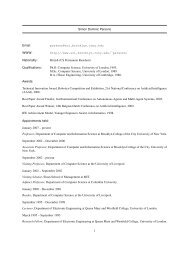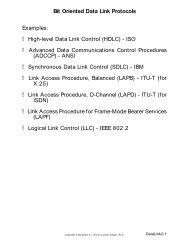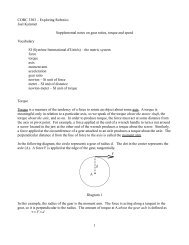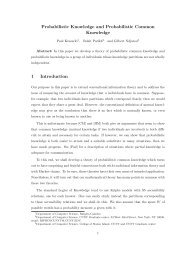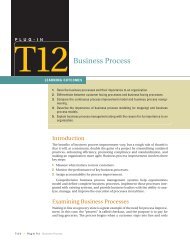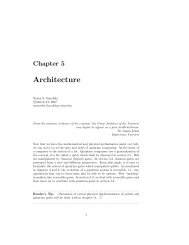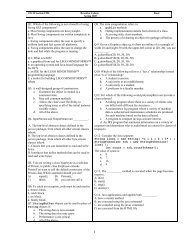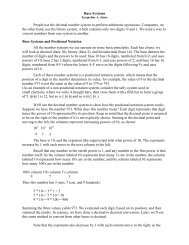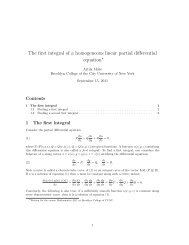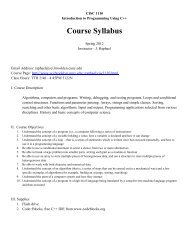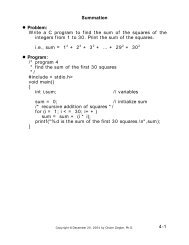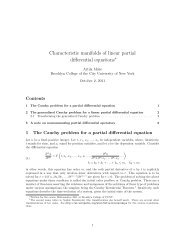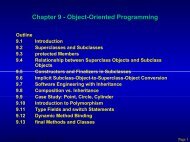*302 Greig and Others v Insole and Others 1977 G. No. 22461977 J ...
*302 Greig and Others v Insole and Others 1977 G. No. 22461977 J ...
*302 Greig and Others v Insole and Others 1977 G. No. 22461977 J ...
Create successful ePaper yourself
Turn your PDF publications into a flip-book with our unique Google optimized e-Paper software.
[1978] 1 W.L.R. 302 Page 28<br />
[1978] 1 W.L.R. 302 [1978] 3 All E.R. 449 (1978) 122 S.J. 162 [1978] 1 W.L.R. 302 [1978] 3 All E.R. 449 (1978)<br />
122 S.J. 162<br />
(Cite as: [1978] 1 W.L.R. 302)<br />
stances (which are subject to the discretion of the<br />
discipline sub-committee) has entered into a written<br />
contract current during the ensuing cricket season<br />
with his county cricket club incorporating a clause<br />
acknowledging the board's rules, regulations or directives.’”<br />
By the time that these proposed new rules were approved<br />
by the TCCB at least 49 cricketers had<br />
entered into contracts with World Series Cricket<br />
(including five from the United Kingdom, five from<br />
Pakistan, five from South Africa, 19 from Australia<br />
<strong>and</strong> 15 from the West Indies); 21 of these played<br />
English county cricket <strong>and</strong> would therefore be affected<br />
by the proposed county cricket ban.<br />
XII The claim of World Series<br />
Cricket against the ICC based on alleged inducement<br />
of breach of contract: question (B) above(1)<br />
The basic principles of law<br />
I am now in a position to deal with the<br />
second of the nine principal questions that fall to be<br />
decided. This relates to the claims of World Series<br />
Cricket against the ICC based on alleged inducement<br />
of breach of contract. In this context, I take<br />
the basic principles of law to be as follows. At<br />
common law, it constitutes a tort for a third person<br />
deliberately to interfere in the execution of a valid<br />
contract which has been concluded between two or<br />
more other parties, if five conditions are fulfilled.<br />
First, there must be either (a) “direct” interference<br />
or (b) “indirect” interference coupled with the use<br />
of unlawful means: see per Lord<br />
Denning M.R. in Torquay Hotel Co. Ltd.<br />
v. Cousins [1969] 2 Ch. 106 , 138. In the<br />
present case, it has not been suggested that either<br />
the ICC or the TCCB has used unlawful means.<br />
World Series Cricket relies only on “direct” interference;<br />
I shall revert later to the meaning of the<br />
word “direct” in this context. As to the meaning of<br />
“interference,” this is not confined to the actual<br />
procurement or inducement of a breach of contract,<br />
it can cover the case where the third person prevents<br />
or hinders one party from performing his contract<br />
even though this be not a breach: see<br />
per Lord Denning M.R. Secondly,<br />
the defendant must be shown to have had knowledge<br />
of the relevant contract. Thirdly, he must be<br />
shown to have had the intent to interfere with it.<br />
Fourthly, in bringing an action, other than a quia<br />
timet action, the plaintiff must show that he has<br />
suffered special damage, that is more than nominal<br />
damage: see Rookes v. Barnard [1964]<br />
A.C. 1129 , 1212, per<br />
Lord Devlin. In any quia timet action, the<br />
plaintiff must show the likelihood of damage to him<br />
resulting if the act of interference is successful: see<br />
Emerald Construction Co. Ltd. v. Lowthian<br />
[1966] 1 W.L.R. 691 , 703 per<br />
Diplock L.J. Fifthly, so far as is necessary,<br />
the plaintiff must successfully rebut any defence<br />
based on justification which the defendant may put<br />
forward. I shall revert later to the meaning of<br />
“justification” in this context.<br />
One point, however, requires to be emphasised.<br />
If these five conditions are fulfilled <strong>and</strong><br />
the defendant is shown to have had that intention to<br />
interfere with the relevant contract which is necessary<br />
to constitute the tort, it is quite irrelevant that<br />
he may have acted in good faith <strong>and</strong> without malice<br />
or under a mistaken underst<strong>and</strong>ing as to his legal<br />
rights; good faith, as such, provides no defence<br />
whatever to a claim based on this tort: see, for example,<br />
South Wales Miners' Federation v.<br />
Glamorgan Coal Co. Ltd. [1905] A.C. 239<br />
, 246, per Lord<br />
Macnaghten. *333<br />
I think that this latter point is common<br />
ground between the parties, as is the fact that it is<br />
no tort to interfere with a void contract: see<br />
Joe Lee Ltd. v. Lord Dalmeny [1927] 1<br />
Ch. 300 . A question that has been the subject<br />
of some argument before me is whether it could<br />
be a tort to induce the breach of a merely voidable<br />
agreement. Mr. Kempster on behalf of the defendants<br />
submitted that it could not constitute a tort for<br />
a third party to induce a person who had a lawful<br />
© 2011 Thomson Reuters.



